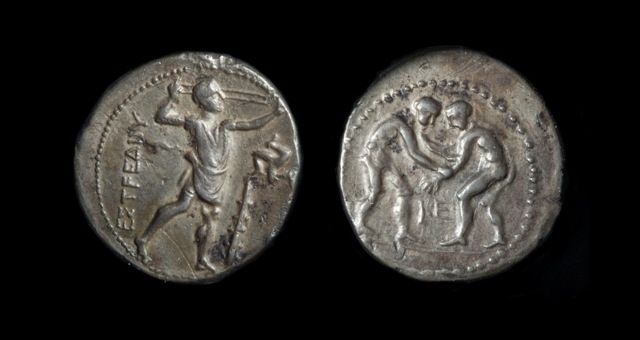Aspendos, Pamphylia Stater.
Dublin Core
Title
Aspendos, Pamphylia Stater.
Subject
Aspendos, Pamphylia (Modern-day Turkey). Silver Stater. Fourth century BCE.
OBVERSE: Two wrestlers engage one another within a circle of dots, between them 'I E.'
REVERSE: Slinger throws, facing right. To his right is a "triskeles."
OBVERSE: Two wrestlers engage one another within a circle of dots, between them 'I E.'
REVERSE: Slinger throws, facing right. To his right is a "triskeles."
Description
Aspendos in Pamphylia was a Greek colony founded by the Argives on the modern-day southern coast of Turkey. In the fifth century BCE, the city began minting coins according to the Persian standard - a different weight system that determined the value of a coin and which was also common in the area.
Having a standing figure featured on the obverse and the reverse of a coin was unusual and makes this coin’s type somewhat remarkable. The wrestlers on the OBVERSE, one of the most well known types from Aspendos, which was introduced in the fourth century BCE, likely refer to a Panhellenic victor from the colony. The slinger is possibly a punning reference to the name of the city, as sphendone (“sling”) sounds similar to Aspendos.
The three-legged symbol, which is called a triskeles, was the badge of the city. Triskeles derives from the Greek prefix meaning three (tri-) and the word for leg (skelos). The FE and partial Phi are likely the initials of the magistrates who oversaw the minting of these coins.
The inscription on the reverse, Estwendiiys, was the Pamphylian word corresponding to the Greek Aspendos. The use of a Pamphylian word on the coin hints that the area had a large indigenous population. However, the connections to Argos are emphasized by the club to the right of the slinger’s leg, a symbol referencing the Argive hero Herakles. The Argives, in fact, bestowed citizenship on the Pamphylians around 330-300 BCE.
Having a standing figure featured on the obverse and the reverse of a coin was unusual and makes this coin’s type somewhat remarkable. The wrestlers on the OBVERSE, one of the most well known types from Aspendos, which was introduced in the fourth century BCE, likely refer to a Panhellenic victor from the colony. The slinger is possibly a punning reference to the name of the city, as sphendone (“sling”) sounds similar to Aspendos.
The three-legged symbol, which is called a triskeles, was the badge of the city. Triskeles derives from the Greek prefix meaning three (tri-) and the word for leg (skelos). The FE and partial Phi are likely the initials of the magistrates who oversaw the minting of these coins.
The inscription on the reverse, Estwendiiys, was the Pamphylian word corresponding to the Greek Aspendos. The use of a Pamphylian word on the coin hints that the area had a large indigenous population. However, the connections to Argos are emphasized by the club to the right of the slinger’s leg, a symbol referencing the Argive hero Herakles. The Argives, in fact, bestowed citizenship on the Pamphylians around 330-300 BCE.
Source
Gift of James and Aneta McIntye, Hallie Ford Museum of Art, Salem, OR. 2006.010.001
Date
4th century BCE
Rights
Hallie Ford Museum of Arts
Format
2.360 cm
10.300 g
10.300 g
Language
Pamphylian/Greek
Type
Coin
Coverage
This item is on view at the Hallie Ford Museum of Art, in the Mark and Janeth Sponenburgh Gallery.
Still Image Item Type Metadata
Original Format
Coin
Citation
“Aspendos, Pamphylia Stater.,” Hallie Ford Museum of Art Exhibits, accessed February 25, 2026, https://library.willamette.edu/hfma/omeka/items/show/52.
